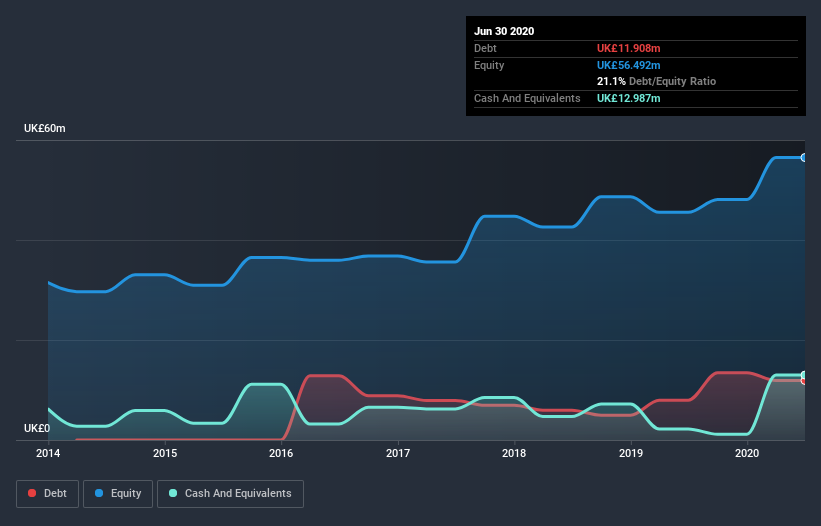- United Kingdom
- /
- Consumer Durables
- /
- AIM:PMP
Portmeirion Group (LON:PMP) Takes On Some Risk With Its Use Of Debt
Warren Buffett famously said, 'Volatility is far from synonymous with risk.' It's only natural to consider a company's balance sheet when you examine how risky it is, since debt is often involved when a business collapses. We can see that Portmeirion Group PLC (LON:PMP) does use debt in its business. But the more important question is: how much risk is that debt creating?
When Is Debt Dangerous?
Debt is a tool to help businesses grow, but if a business is incapable of paying off its lenders, then it exists at their mercy. Part and parcel of capitalism is the process of 'creative destruction' where failed businesses are mercilessly liquidated by their bankers. However, a more common (but still painful) scenario is that it has to raise new equity capital at a low price, thus permanently diluting shareholders. By replacing dilution, though, debt can be an extremely good tool for businesses that need capital to invest in growth at high rates of return. When we examine debt levels, we first consider both cash and debt levels, together.
View our latest analysis for Portmeirion Group
What Is Portmeirion Group's Net Debt?
You can click the graphic below for the historical numbers, but it shows that as of June 2020 Portmeirion Group had UK£11.9m of debt, an increase on UK£7.97m, over one year. However, it does have UK£13.0m in cash offsetting this, leading to net cash of UK£1.08m.

A Look At Portmeirion Group's Liabilities
We can see from the most recent balance sheet that Portmeirion Group had liabilities of UK£17.4m falling due within a year, and liabilities of UK£16.2m due beyond that. Offsetting this, it had UK£13.0m in cash and UK£12.0m in receivables that were due within 12 months. So it has liabilities totalling UK£8.61m more than its cash and near-term receivables, combined.
Given Portmeirion Group has a market capitalization of UK£66.0m, it's hard to believe these liabilities pose much threat. But there are sufficient liabilities that we would certainly recommend shareholders continue to monitor the balance sheet, going forward. Despite its noteworthy liabilities, Portmeirion Group boasts net cash, so it's fair to say it does not have a heavy debt load!
It is just as well that Portmeirion Group's load is not too heavy, because its EBIT was down 40% over the last year. When a company sees its earnings tank, it can sometimes find its relationships with its lenders turn sour. When analysing debt levels, the balance sheet is the obvious place to start. But ultimately the future profitability of the business will decide if Portmeirion Group can strengthen its balance sheet over time. So if you're focused on the future you can check out this free report showing analyst profit forecasts.
Finally, while the tax-man may adore accounting profits, lenders only accept cold hard cash. Portmeirion Group may have net cash on the balance sheet, but it is still interesting to look at how well the business converts its earnings before interest and tax (EBIT) to free cash flow, because that will influence both its need for, and its capacity to manage debt. In the last three years, Portmeirion Group's free cash flow amounted to 39% of its EBIT, less than we'd expect. That's not great, when it comes to paying down debt.
Summing up
Although Portmeirion Group's balance sheet isn't particularly strong, due to the total liabilities, it is clearly positive to see that it has net cash of UK£1.08m. So although we see some areas for improvement, we're not too worried about Portmeirion Group's balance sheet. The balance sheet is clearly the area to focus on when you are analysing debt. But ultimately, every company can contain risks that exist outside of the balance sheet. For example, we've discovered 4 warning signs for Portmeirion Group (1 is significant!) that you should be aware of before investing here.
Of course, if you're the type of investor who prefers buying stocks without the burden of debt, then don't hesitate to discover our exclusive list of net cash growth stocks, today.
When trading Portmeirion Group or any other investment, use the platform considered by many to be the Professional's Gateway to the Worlds Market, Interactive Brokers. You get the lowest-cost* trading on stocks, options, futures, forex, bonds and funds worldwide from a single integrated account. Promoted
New: Manage All Your Stock Portfolios in One Place
We've created the ultimate portfolio companion for stock investors, and it's free.
• Connect an unlimited number of Portfolios and see your total in one currency
• Be alerted to new Warning Signs or Risks via email or mobile
• Track the Fair Value of your stocks
This article by Simply Wall St is general in nature. It does not constitute a recommendation to buy or sell any stock, and does not take account of your objectives, or your financial situation. We aim to bring you long-term focused analysis driven by fundamental data. Note that our analysis may not factor in the latest price-sensitive company announcements or qualitative material. Simply Wall St has no position in any stocks mentioned.
*Interactive Brokers Rated Lowest Cost Broker by StockBrokers.com Annual Online Review 2020
Have feedback on this article? Concerned about the content? Get in touch with us directly. Alternatively, email editorial-team@simplywallst.com.
About AIM:PMP
Portmeirion Group
Manufactures, markets, and distributes ceramics, home fragrances, and associated homeware products in the United Kingdom, South Korea, North America, and internationally.
Mediocre balance sheet with low risk.
Similar Companies
Market Insights
Community Narratives




